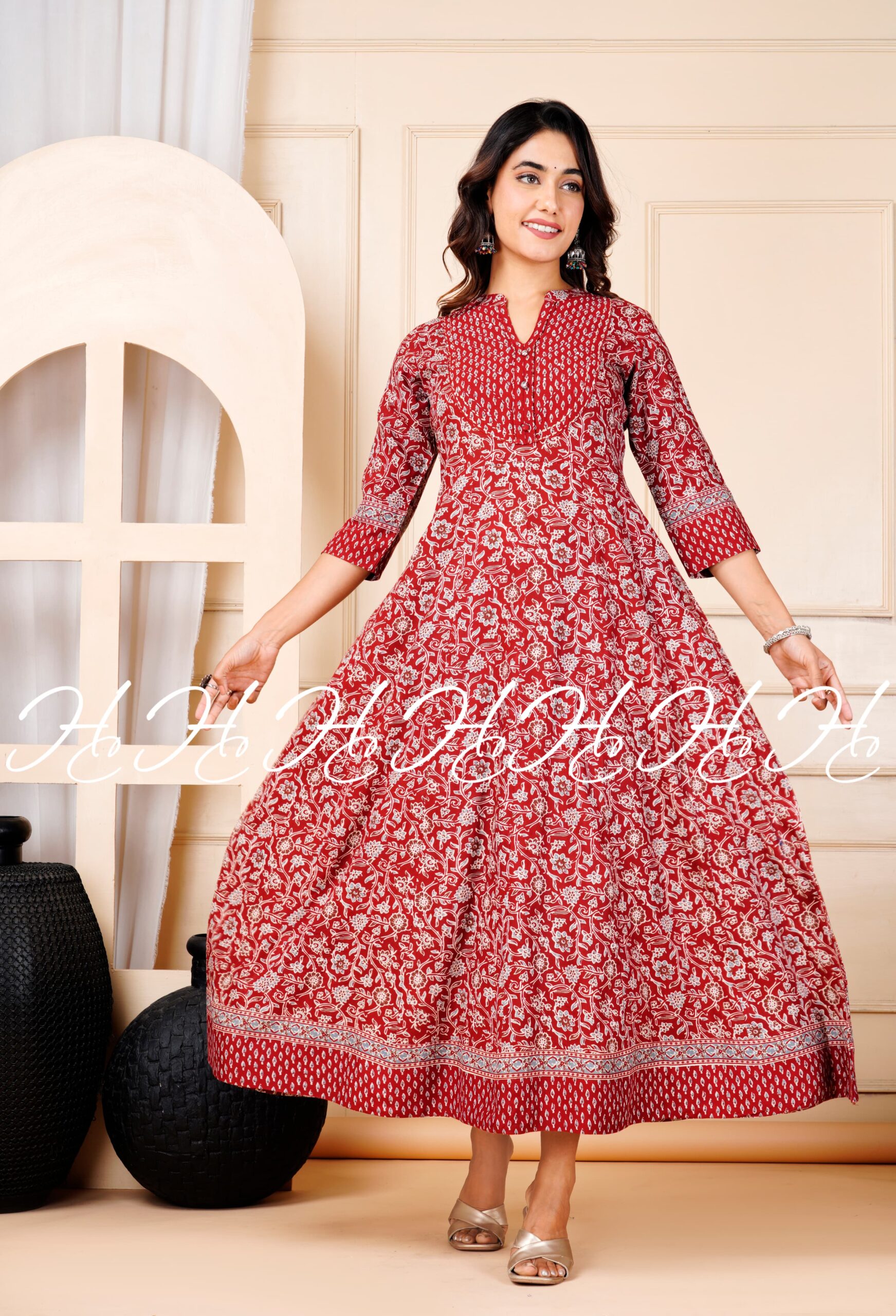What is the difference between local wholesalers and wholesale kurti manufacturers?

The fashion industry in India has grown rapidly, with Kurtis becoming one of the most popular ethnic wear choices among women. From casual daily wear to festive Anarkalis, the kurti market offers something for everyone. For retailers and boutique owners, the major decision lies in choosing between sourcing products from local wholesalers or directly from wholesale kurti manufacturers in Jaipur. Both options have their advantages, but the differences can significantly impact pricing, fabric quality, design variety, and long-term business growth.
In this article, we will explore the key differences between local wholesalers and wholesale manufacturers, while also highlighting why Jaipur remains one of the most trusted hubs for Kurti manufacturing. We will also look into how an Anarkali kurti factory Jaipur caters to bulk buyers with a more structured and scalable approach.
1. Product Sourcing and Supply Chain
Local wholesalers act as middlemen. They purchase Kurtis from different factories or manufacturers and sell them to small retailers. While they provide accessibility and convenience, they often lack direct control over product quality and originality.
On the other hand, wholesale kurti manufacturers in Jaipur like Harsh Creation design, produce, and distribute Kurtis directly. Since they manage the production process from fabric selection to stitching and finishing, they maintain strict control over quality. Retailers buying from manufacturers receive fresh designs straight from the production line rather than relying on what wholesalers have in stock.
2. Pricing and Profit Margins
One of the biggest differences between local wholesalers and manufacturers lies in pricing. Local wholesalers purchase products in bulk from factories and then add their profit margins before selling them to retailers. This additional markup often reduces the retailer’s overall profit margins.
Wholesale manufacturers eliminate this middle layer. When a retailer sources directly from an Anarkali kurti factory Jaipur, they save on intermediary costs, ensuring better wholesale rates. Retailers can then offer competitive prices to customers while maintaining higher profit margins.
3. Product Variety and Customization
Local wholesalers generally provide limited stock. Their offerings are based on what they purchase from multiple sources, which means retailers often get standard designs that may already be circulating widely in the market.
In contrast, wholesale manufacturers invest in trend analysis and seasonal designs. For instance, wholesale kurti manufacturers in Jaipur introduce new collections every season, keeping in mind festivals, regional preferences, and modern fashion trends. Many manufacturers also accept bulk customization requests. Retailers can request specific patterns, fabrics, or even exclusive designs to differentiate themselves in the competitive market.
4. Fabric Quality and Durability
Since wholesalers do not produce Kurtis themselves, they cannot guarantee consistent fabric quality. A retailer may find one batch durable and appealing, while the next might lack finishing or shrink after a wash. This inconsistency can damage the retailer’s reputation with customers.
Manufacturers, however, pay close attention to fabric sourcing. Jaipur, known as the textile hub of India, has a rich tradition of using high-quality cotton, silk blends, rayon, and georgette in ethnic wear. An Anarkali kurti factory Jaipur ensures every piece passes through multiple quality checks. This commitment to fabric quality builds long-term trust with retailers and end customers.
5. Scalability for Business Growth
Local wholesalers usually operate on a smaller scale. They may have limited inventory and might struggle to meet large, urgent orders. This can become a challenge for boutique owners or retailers looking to expand their business.
On the other hand, wholesale manufacturers specialize in large-scale production. With in-house stitching units, embroidery sections, and skilled artisans, they can handle bulk orders with ease. Retailers collaborating with established names like Harsh Creation can scale their businesses quickly, knowing that manufacturers can consistently supply products in large volumes without compromising on quality.
6. Market Trust and Branding
Local wholesalers often sell unbranded products, making it difficult for retailers to establish a unique identity in the market. Customers today are more conscious of brand reputation and fabric quality, which adds value to branded Kurtis.
Manufacturers, however, often promote their own brands and create catalogs for bulk buyers. When a retailer sources directly from wholesale kurti manufacturers in Jaipur, they get access to branded collections that elevate their shop’s credibility. This not only attracts repeat customers but also enhances the retailer’s brand image.
7. After-Sales Support and Relationship Building
Local wholesalers usually operate on transactional terms. Once the purchase is made, they rarely provide after-sales support. Retailers may find it difficult to resolve issues like damaged stock, fabric complaints, or design mismatches.
Manufacturers, however, focus on building long-term partnerships. Many factories in Jaipur maintain dedicated support teams for bulk buyers. They also share catalogs, lookbooks, and design previews, helping retailers plan their seasonal collections more effectively. This professional approach creates a stronger and more reliable business relationship.
Conclusion
The choice between local wholesalers and wholesale manufacturers depends on a retailer’s business goals. Local wholesalers may work for small-scale buyers seeking quick purchases, but they often lack consistency in pricing, fabric quality, and customization.
On the other hand, sourcing directly from wholesale kurti manufacturers in Jaipur offers retailers long-term benefits. From better pricing and profit margins to superior quality and exclusive designs, manufacturers empower retailers to stay competitive in a dynamic fashion market. An Anarkali kurti factory Jaipur further ensures large-scale production and on-time delivery for growing businesses.
For boutique owners and retail shopkeepers who want to grow steadily, building direct ties with reputed manufacturers like Harsh Creation provides a reliable foundation. By partnering with a trusted manufacturer, retailers not only secure better products but also strengthen their reputation in the ethnic wear market.
recent post
A Casa Pariurilor Applikáció Előnyei és Használati Útmutatója
January 17, 2026
Starzino Nederland: De Ultieme Gids voor Online Casino Liefhebbers
January 17, 2026
CONTACT US

Category
- 1! No category
- 1! No category 9-1 Spanish
- 1! No category 9-2 Spanish
- 1! No category 9-3 Spanish
- 1! No category 9-4 Spanish
- 15! Без рубрики
- 11
- 110betcasino-mx.com
- 110Mostbet
- 111.12 article
- 111Mostbet
- 112-14.11
- 112Mostbet
- 11casino
- 11redcasinonetherlands.com
- 21xbet
- 11xbet arabic
- 11xbet Korea
- 11xbet RU
- 61xbet russian1
- 11xbet-india-online.in3
- 11xbet1
- 11xbet10
- 11xbet11
- 11xbet12
- 21xbet2
- 21xbet5
- 21xbet6
- 11xbet8
- 11xbet9
- 11xbetfrance.win
- 120betcasinoportugal.com
- 120betgermany.com
- 120betitaly.com
- 121betcasinoitalia.com
- 121casinodeutschland.com
- 122bet
- 124-casino-suomi.com
- 125.11
- 125.12
- 12casino
- 12Mostbet
- 132red-casino.us
- 13Mostbet
- 34122
- 14Mostbet
- 14rabetbd.cc
- 1500casinodk.com
- 1500casinouk.uk
- 15lionsmegaways.co.uk
- 1777casinopl.com
- 1777casinosouthafrica.com
- 1777casinosuisse.com
- 17bet-no.com
- 17bitcasinoaustralia.net
- 17bitcasinocanada.net
- 17Mostbet
- 1888casino-nz.com
- 1888casinobelgium.com
- 1888casinobrasil.com
- 1888casinocanada.net
- 1888casinoitalia.net
- 188fortunes.org
- 19Mostbet
- 8a16z generative ai
- 1abukingcasino.us
- 1admiral-casino-italia.com
- 2adobe generative ai 2
- 1adonnasbakery.net
- 1adventurefilmfestival.gr
- 1agent-no-wager.uk
- 1ai chat bot python
- 1Ai News 2025
- 1allslotscasinonz.com
- 1amonbetnederland.com
- 1amunracasino.us
- 1amunracasinoitalia.net
- 1ancorallZ 1500
- 2ancorallZ 2000
- 1andarbahar.us
- 1apoteka1
- 2armynow.net
- 1articles
- 1avantgardecasinouk.uk
- 1avia-masters.win
- 1aviamasters-games.net
- 1bally-casino.us
- 1ballycasinouk.me.uk
- 1bankonbet.us
- 1bankonbetes.net
- 1bankonbetgr.com
- 1bankonbetnorge.com
- 1basswin.us
- 1basswinukcasino.uk
- 2bauhutte-g.com
- 1bc-game-france.com
- 1bc-game-uk.uk
- 1bcgame-norge.com
- 1bcgame-southafrica.com
- 4bcgame1
- 3bcgame2
- 2bcgame3
- 2bcgame4
- 2bcgame5
- 1bcgamee-ro.com
- 1bdmbetespana.net
- 1behar.hr
- 1bengalii
- 1bestdiplomsa.com
- 1bet365casinomexico.com
- 1betandreas2
- 1betandreas3
- 1betandres4
- 1betanocasinoargentina.com
- 1betcasino1
- 2betcasino2
- 2betcasino3
- 1betcasino4
- 1betfredcasinosouthafrica.com
- 1beticcasinoitalia.com
- 1betnerocasinoitalia.com
- 1betonred-australia.net
- 1betonred-cz.org
- 1betonreddeutschland.com
- 1betonredespana.net
- 1betonredfrance.com
- 1betonreditaly.net
- 1betonredpl.win
- 1betonredportugal.net
- 1bettingcasino2
- 1bettingcasino3
- 1bettingcasino5
- 1bettyspincanada.com
- 1bettywinscasino.app
- 1bettywinscasinocanada.com
- 1betvictorcasinonz.com
- 1betwaycasinogamessouthafrica.com
- 1betwaycasinonz.com
- 1betwinner1
- 1betwinneк2
- 1bigbambooslot.win
- 1bigbassbonanza.cc
- 1bigbassbonanza.cc2
- 1bigbasssplash.cc
- 1bigbasssplash.com.es
- 1bigbasssplashdemo.co.uk
- 1bigbeverage.net
- 1bigboostcasinoindia.com
- 1billionairespincz.com
- 1billionairespinfrance.com
- 1bingocasino-us.us
- 1bitstarzcanada.com
- 1bitstarzcasinodeutschland.com
- 1bizzo.at
- 1bizzocasinoespana.net
- 1bizzocasinoitalia.org
- 1802blog
- 1bobcasinocanada.com
- 1book-of-dead-slot.org
- 1bookmakers1
- 1boomerang-casino-de.net
- 1boomerang-casinonederland.com
- 1boomerangcasino-greece.com
- 1br-333casino.com
- 1br-777casino.com
- 1brango-casino-us.us
- 1brangocasinoitalia.com
- 1bridgestl.org
- 57Business
- 1bwincasinoosterreich.com
- 1candy-spinz-casino.com.de
- 1candyspinzespana.com
- 1canplaycasinocanada.net
- 1Capospin Ελλάδα
- 1captaincookscasinonz.com
- 1captainjack-casino.us
- 1captainjackcasinofrance.com
- 10Career
- 1carlosserrano.org
- 1casadonramon.com.mx
- 1casapariurilor-deutchland.com
- 1casapariurilor-hungary.com
- 1casapariurilor-nl.com
- 1casapariurilor-ro.com
- 1cashwincasino.us
- 1casimbacasino.uk
- 1casiniacz.com
- 17casino
- 1casino en ligne luxembourg
- 1casino en ligne suisse legal
- 1casino-napoleonfr.com
- 1casino01-12-1
- 1casino01261
- 1casino01262
- 1casino01264
- 1casino01265
- 1casino01266
- 1casino0212
- 1casino06121
- 1casino1
- 1casino1225
- 1casino12251
- 1casino1601
- 1casino17012
- 1casino2
- 1casinoaction-canada.com
- 2casinobet1
- 1casinobet10
- 1casinobet11
- 1casinobet12
- 1casinobet13
- 1casinobet15
- 1casinobet16
- 1casinobet18
- 2casinobet2
- 1casinobet22
- 1casinobet24
- 1casinobet26
- 1casinobet28
- 1casinobet29
- 1casinobet3
- 1casinobet30
- 1casinobet32
- 1casinobet33
- 1casinobet4
- 3casinobet5
- 1casinobet7
- 1casinobet8
- 1casinoclassicaustria.com
- 1casinocz1
- 1casinocz2
- 1casinodayscanada.org
- 1casinoguruaustralia.com
- 1casinogurusouthafrica.com
- 1casinojaya9
- 1casinomaniaitalia.net
- 1casinon1bet.us
- 1casinoonline2
- 2casinoslot1
- 1casinoslot2
- 1casinoslot3
- 2casinoslot4
- 1casinoslot5
- 1casinotropezcanada.com
- 1casinoworldau.net
- 2casono02123
- 1casumo-casino-uk.uk
- 1catholicmyanmar.org
- 1cazeuscasinoitalia.com
- 1cazeusfrance.com
- 1CH
- 2chefi.gr
- 1chicken-cross.org
- 1chicken-road-game.org.uk
- 1chicken-road-it.org
- 1chicken-road2.co.uk
- 1chicken-road2.us
- 1chickenroadespana.com
- 1chickenroadgame.cc
- 1chickenrush.us
- 1CIB
- 1cityoflondonmile1
- 1classiccasino.us
- 1cleopatraslot.us
- 1clovermagic.net
- 1clovermagic.us
- 1clovermagiccasino.us
- 1club-playercasinofr.com
- 1cocoacasino-uk.uk
- 1comeoncasino.us
- 1comeoncasinodk.com
- 1conquestadorcasinoireland.com
- 1coolzinodeutschland.com
- 1coolzinoespana.com
- 1coralcasinoireland.com
- 1corgibetcz.com
- 1corgibetgreece.com
- 1corgibetmagyar.com
- 1cosmocasinonz.net
- 1cresuscasino1.net
- 1cresuscasinofrance.net
- 1croskills.hr
- 1crownplaycasino-au.net
- 1curiumpalacehotel.com.cy
- 1cymic.org.cy
- 1davincigoldcasinode.com
- 1definemystyle.com
- 1denderacasino.com.de
- 1denderacasinoaustralia.com
- 1digitalgmu.ru 2000
- 1diplomm-i2
- 1diplomrums2
- 1diplomrums3
- 1dollycasinoitalia.net
- 1dollycasinoitalia.org
- 1dollycasinoosterreich.com
- 1dollycasinopl.com
- 1donbetcasino-it.com
- 1dreams-casinouk.uk
- 1dreamscasinoonlineargentina.com
- 1dreamvegascasino.us
- 1dreamvegascasinocanada.com
- 1dropthebossgame.us
- 1dsfgsdg
- 1duelzcasino-suomi.com
- 1EC
- 1edudiplomsa
- 1egu-diplom1
- 1egu-diplom2
- 1egu-diplom3
- 1en 1430
- 1encefa.com
- 1energy-casinopl.com
- 1energycasino-hu.net
- 1eurobetcasinoitalia.com
- 1eyeofhorus.cc
- 1farmacia2
- 1fatbetcasinoitalia.com
- 1fatboss.us
- 1fatbosscasinofrance.com
- 1fatpiratecasinoespana.com
- 1fatpiratecasinopolska.com
- 1fatpirateitaly.com
- 1fatpirateuk.uk
- 1felixspinitalia.com
- 1felixspinosterreich.com
- 0fiestaklub.hu
- 13Finance
- 1fireinthehole3.uk
- 1fivebetcasinoitalia.com
- 1fortunacasino.us
- 1fortunacasinocz.com
- 1fortunacasinode.com
- 1fortunacasinoromania.com
- 1fortuneoxplataforma.com
- 1funkyaardvark.co.uk
- 1gambloriapolska.com
- 1gamdom-france.com
- 1gamdom-lt.com
- 1gamdom-ro.com
- 1gamdom-tr.net
- 1gamdomireland.com
- 1gamdommexico.com
- 1gamdomportugal.com
- 1gamingclubcasinocanada.net
- 1gatesofolympus1000.com.de
- 1gatesofolympusslot.cc
- 1gatesofolympussuperscatter.co.uk
- 1gatesofvalhalla.org.uk
- 1getpicpal.com
- 1glorycasinoapp.win
- 1goldblitzextreme.com
- 1goldencrowncasinoaustralia.net
- 1goldenmister.us
- 1gosz-diplomas1
- 1gosz-diplomas3
- 1gosz-diplomas4
- 1gosz-diplomas5
- 1grandearmadio.com
- 1grandivy.us
- 1grandmondialcasinocanada.com
- 1grandmondialcasinoosterreich.com
- 1grandmondialcasinoslovensko.com
- 1gransinogreece.com
- 1gxmblecasinofrance.com
- 1hell-spin-casino-australia.net
- 1hellspin-casino-australia.org
- 1hellspinaustralia.win
- 1heyspin.us
- 1highflybetbelgium.com
- 1hitnspinbelgique.com
- 1hitnspindeutschland.net
- 1hoghospice.org
- 1hollywoodbetsmz.com
- 244Home
- 1hothotfruit.co.uk
- 1hotslotspl.net
- 1hrcarers.org.uk
- 1hudsunmedia.com
- 1huffnevenmorepuff.us
- 1huffnmorepuff.uk
- 2imvest.it
- 1instantcasinofr.net
- 1instaspincasino-nl.net
- 1investacadiana.org
- 10Investment
- 1iris.mk
- 1irwincasino.us
- 1istoriesadespoton.gr
- 1ivibetgreece.com
- 1ivibetkasyno.net
- 1ivycasino.net
- 1izzicasinocanada.com
- 1jackpotcitycasinonz.net
- 1jackpotcityitaly.com
- 1jackpotcitynz.net
- 1jackpotcitysouthafrica.com
- 1jackpotvillage.us
- 1jamesbrausch.com
- 1jaya92
- 1jonbet.br.com
- 1jonsk.mk
- 2jos-trust
- 1joycebarlow.com
- 1justcasino.me.uk
- 1justcasino.us
- 1justcasinonz.net
- 1karamba-casino-de.com
- 1karaokemelody.com
- 1katanaspincasino.org.uk
- 1katanaspinuk.uk
- 1kazino2
- 1khl.hr
- 1king-billy-casino-australia.net
- 1kingbillycasinoaustralia.net
- 1kingbillycasinocanada.com
- 1kingbillycasinoitalia.com
- 1kingjohnnie.us
- 1kingmakercasinoitalia.net
- 1kittyglitter.games
- 1korrekt29.ru 36
- 1krsosh.ru 1000
- 1ladbrokescasinous.us
- 1lalabetnederland.net
- 1legacyofdeaddemo.com.de
- 1lemoncasinocanada.org
- 1lemoncasinode.net
- 1leoncasinoaustralia.net
- 1leoncasinonz.com
- 1leovegascasinoitalia.com
- 1lepharaohslot.us
- 1limitless-casinonz.com
- 1livescorebetbg.com
- 1livescorebetireland.com
- 1longpawscomedy.co.uk
- 1loreleibrewing.beer
- 1lottoland-uk.uk
- 1lucky7-casino.us
- 1luckygreencasino.us
- 1luckyonescasinocanada.org
- 1luckyonescasinonz.com
- 1luckyonescasinoosterreich.com
- 1lukkicasinodeutschland.com
- 1lunacasinoespana.com
- 1madamedestinyslot.net
- 1magicredcasinode.com
- 1magiuscasinofrance.net
- 1magiuscasinopolska.com
- 1malinacasinofrance.net
- 1marketasdiplomas1
- 1marketasdiplomas2
- 1marketasdiplomas3
- 10Marketing
- 1marniegrundman.com
- 1Maxi reviewe
- 1mediabetcasinoitalia.com
- 1megacasinoespana.com
- 1megajokernetent.com
- 1megajokerslot.net
- 1melbetaz.net
- 1melbetcasinoindia.com
- 1melbetcionline.com
- 1melbetmexico.net
- 1metalcasinosuomi.com
- 1meteo-news.gr
- 1millionercasinoespana.com
- 1minesgame.org.uk
- 1mini-review
- 5Mini-reviews
- 1mombrand
- 16monobrand
- 11monobrend
- 1monrocasinobrasil.com
- 1monrocasinoportugal.com
- 1montecryptoscasinos.com
- 1moonwincasinoau.com
- 1More
- 0morozovskobr.ru
- 2mostbet
- 1mostbet2
- 1mostbet3
- 1mostbet4
- 1mostbetcasinonl.com
- 1mrbetcasinode.net
- 1mrbetcasinopl.net
- 1mrfortunecasinocanada.com
- 1mrgreencasinoireland.com
- 1mrgreencasinosverige.com
- 1mrpunter-gr.net
- 1mrpunter-nl.com
- 1mrvegasuk.uk
- 1mxfuncasino.com
- 1myempirecasinodeutschland.com
- 1myempirecasinoitalia.com
- 1mystakecasinoargentina.com
- 1n1betcasino.uk
- 1n1casinoat.com
- 1napoleoncasino.uk
- 1needforslotsaustralia.com
- 1neospinaustralia.net
- 1netbet-casinode.com
- 1netwincasinoitalia.com
- 1Neue Casinos Schweiz 2025
- 2NEW
- 298News
- 1newvegascasinoes.com
- 1ninecasino-gb.uk
- 1ninecasinodeutschland.com
- 1ninecasinofrance.org
- 1ninecasinoportugal.com
- 1nominicasinoitalia.com
- 1NonGamStopCasinos
- 1novibetcasinoitalia.com
- 2nvcasinoonline.com.de
- 1nystagmus.me
- 1oddboy.nz
- 1ohridtrail.mk
- 1oishidelights.org
- 6Omegle
- 6Omegle cc
- 1onecasinodeutschland.com
- 1onecasinonz.org
- 1onecasinosuomi.com
- 10Online Business
- 2onlinecasino1
- 1onlinecasino1401
- 1onlinecasinoslot1
- 1onlinecasinoslot10
- 1onlinecasinoslot11
- 1onlinecasinoslot12
- 1onlinecasinoslot13
- 1onlinecasinoslot14
- 1onlinecasinoslot15
- 1onlinecasinoslot17
- 1onlinecasinoslot18
- 1onlinecasinoslot19
- 1onlinecasinoslot20
- 1onlinecasinoslot21
- 1onlinecasinoslot22
- 1onlinecasinoslot23
- 1onlinecasinoslot24
- 1onlinecasinoslot26
- 1onlinecasinoslot27
- 1onlinecasinoslot29
- 1onlinecasinoslot30
- 1onlinecasinoslot31
- 1onlinecasinoslot4
- 1onlinecasinoslot5
- 1onlinecasinoslot7
- 1onlinecasinoslot8
- 1onlinemarriageregistration.com x
- 1oreginadiploma
- 1oscarspinespana.com
- 1oscarspinitalia.com
- 1oshicasinoaustralia.net
- 1ozwin-casino-australia.org
- 1ozwincasino.uk
- 18Pablic
- 1pachinkogame.cc
- 1pacific-spins-casino-canada.net
- 1paradise8-casino.us
- 2parcadfer.com
- 1parimatch-uk.uk
- 1parimatchfr.com
- 1parimatchkz.net
- 1partiggiano.com
- 1partycasinocanada.net
- 1Paysafecard casino
- 1penaltyshootout.us
- 1Pin UP Online Casino
- 1Pin-Up oyunu
- 1Pin-Up TR
- 1Pin-Up UZ
- 1pin-up-casinoazerbaijan.com
- 1pin-up-casinouzbekistan.com
- 1pinup-casinochile.com
- 1pinup-casinoperu.com
- 1pinup-kazino-kz.top
- 1pinup-kazino-login.top
- 1pinup-official-kz.top 3
- 1pinupazerbaycan.win
- 1pinupcasino-turkiye.com
- 1pirs67.ru 50
- 1pistolocasinodeutschland.com
- 1pistolocasinouk.uk
- 1pixiesoftheforest.cc
- 1planet7casinofr.com
- 1planetwin365casinoitalia.com
- 1platinumplaycasinonz.com
- 1playamocasinocanada.net
- 1playcroco.uk
- 1playjonnycasinobelgie.com
- 1playjonnydeutschland.com
- 1playojo.games
- 1playojoespana.com
- 1playojouk.co.uk
- 1playregalespana.com
- 1playuzuespana.net
- 1playzee-nz.net
- 1playzee.uk
- 1plexbetcasinoitalia.com
- 2plinko-official.com
- 1plinkoespana.com
- 1plinkogamecasino.net
- 1plinkogamedownload.in
- 1plinkorecensioni.org
- 1poduzetnicki-centar.hr
- 1pokerstarscasinocanada.net
- 1pokerstarscasinoindia.com
- 1pokerstarscasinoitalia.net
- 1posidocasinofrance.com
- 55Post
- 1pragmaticplayslots.cc
- 1prava-potrosaca.hr
- 1princesscasinoitalia.com
- 1prviput.hr
- 1psiloritis-natural-park.gr
- 103Public
- 1quatrocasinocanada.org
- 1rabonaosterreich.com
- 1ragingbullcasinocanada.net
- 1ragingrhino.org
- 1rainbowriches.cc
- 1rainbowrichesslots.uk
- 1razedcasinonz.com
- 1retrobetcanada.com
- 1retrobetosterreich.com
- 5review
- 18Reviewe
- 11reviewer
- 1richardcasino.us
- 1rickycasinoaustralia.net
- 1rizk-casinonz.com
- 1rizkcasinonz.com
- 1rjlprecisioneng.co.uk
- 1robocatfrance.com
- 1robocathungary.com
- 1rocketplaycasinocanada.net
- 1rocketplaynewzealand.com
- 1rolandjaccard.com
- 1rollx-game.org
- 1rollxocanada.com
- 1roobetcasinocanada.com
- 1rooli-casino-australia.net
- 1roolicasinoaustralia.net
- 1roolicasinocanada.net
- 1roulettinoportugal.com
- 1royal-vegas-canada.com
- 1royalcasinoitalia.com
- 1royaljeet247.win
- 1royalvegasnz.net
- 1rtbetcanada.com
- 1rtbetgreece.com
- 1rubds54.ru 36
- 1rubyfortune-casino.us
- 1rubyfortunecasinonz.com
- 1satbet-india.net
- 1satbet.us
- 1savaspin-be.com
- 1savaspin.us
- 1savaspincasino-de.com
- 1savaspinespana.com
- 1savaspinfrance.com
- 1savaspinitaly.com
- 1selust.com 1000
- 1Semaglutide Online
- 1seven-casinode.com
- 1sgcasinoitalia.net
- 1sgcasinoosterreich.com
- 1sigurnahrvatska.hr
- 1silveroak-casinosouthafrica.com
- 1siti-scommesse2
- 1sky-bet-india.com
- 1sky-vegas.uk
- 1skybet-ng.com
- 1skybetsouthafrica.com
- 1skycrown-casino-australia.net
- 1slingocasinouk.uk
- 4slot
- 1slotbox-at.com
- 1slotboxsuomi.com
- 1slotcasini1
- 1slotcasino1
- 1slotlordscasinocanada.com
- 1slotlordsdeutschland.com
- 1slotmafiaaustralia.com
- 1Slots
- 1slots-magic.us
- 1slotspalacesuomi.com
- 1slotstemple-de.com
- 1slotstemple.us
- 1slovenska-pomlad
- 1smokacecasinoitalia.com
- 1snaicasinoitalia.com
- 1snatchcasinoat.com
- 1snatchcasinopl.com
- 1solcasinocanada.net
- 1solcasinochile.com
- 1solidarnost.mk
- 1spain
- 1spin-casino-chile.net
- 1spin-casino-nz.net
- 1spinangacz.com
- 1spinangadeutschland.com
- 1spinaway-casino.us
- 1spingeniecanada.com
- 1spingenieespana.com
- 1spingrannyespana.com
- 1spingrannyitaly.com
- 1spinmama-de.com.de
- 1spinmama-pt.com
- 1spinmamaespana.com
- 1spinmamafrance.net
- 1spinmamaitaly.net
- 1spinpalace-casino.us
- 1spinpalacecasinofrancais.com
- 1spinsy-casino-france.org
- 1spinsycasinocanada.com
- 1spiritcasinonz.com
- 1srisailamonline.com c1
- 1stanleybetcasinoitalia.com
- 1starcasinoitalia.com
- 1stockx.co.nz
- 1sunaonal.com 1000
- 1sunofegypt3.uk
- 1super-ufa-slot.com
- 1superbetcasinobr.com
- 1superbetcasinosouthafrica.com
- 1supercharged clovers app
- 1superchargedcloversslot.com
- 1sweet-bonanza-germany.com
- 1sweet-bonanza-italy.com
- 1sweetbonanzajogo.com
- 1sweetbonanzaslot.us
- 1swift-casino-uk.uk
- 1swiftcasinoespana.com
- 1t.meriobet_zerkalo_na_segodnya 3000
- 1tarifahip.com
- 1tedxmarseille.com
- 1teenpattigame.win
- 2test
- 1texts
- 1tfsvl.co.uk
- 1theathinai.com
- 1thedoghousemegaways.us
- 1thegeekyglobe.com
- 1thegrandivy.org
- 1thewonder
- 1this-isvegascasino.uk
- 1thorpemarket.org.uk
- 1thunder coins
- 1tombolaargentina.com
- 1tombolaireland.com
- 1tombolanl.com
- 1tombolauruguaya.com
- 1tonyspinscanada.com
- 1total-casino-de.com
- 1totalcasinodk.com
- 1totalcasinosv.com
- 1tower-x-game.net
- 1towerxgames.net
- 1Trends
- 1true-fortune-casino-uk.uk
- 1truefortunecasinoaustralia.com
- 1tsarscasino.us
- 1tsarscasinocanada.com
- 1twincasino-sv.com
- 1twincasinouk.uk
- 1twinspin-it.com
- 1ultraholdandspinslot.com
- 61uncategorized
- 1unibet-magyar.net
- 1unibet-pl.com
- 1unibetcanada.com
- 1unibetgr.com
- 1unibetnl.org
- 1unibetnorge.net
- 1unibetro.com
- 1unibetschweiz.com
- 1uniquecasinofrance.net
- 1uniquecasinoitalia.com
- 3Up X
- 1UP X Casino
- 1UP x Бонусы
- 1vbet-france.net
- 1vbet-online.us
- 1vbet-sverige.net
- 1vbetdeutschland.com
- 1vdbf.org
- 1vegasherocasino.co.uk
- 1vegasino-portugal.com
- 1vegasinogreece.com
- 1vegasinopoland.com
- 1vem-apostar-pt.net
- 1vemapostar-portugal.net
- 1verdecasino-deutschland.net
- 1verdecasino.co.uk
- 1verdecasinoitalia.net
- 1verdecasinonorge.com
- 1verdecasinopl.net
- 1verdecasinoportugal.com
- 1verdecasinoromania.net
- 1verywellcasino.org.uk
- 1videoslots-sl.com
- 1videoslotscasino-de.com
- 1videoslotscasinofi.com
- 1villentocasinocanada.net
- 1villentocasinonz.net
- 1vincispinfrance.net
- 1virgin-casino.us
- 1vladcasinoitalia.com
- 1vodds
- 1voddscasino
- 1vulkanvegascanada.com
- 1vulkanvegasdenmark.com
- 1wanabet.us
- 1wanabetespana.com
- 1wanteddeadorawild-pt.top
- 1wanteddeadorawild.uk
- 1wazambade.com
- 1wazambaslovenija.com
- 1wbcommunitytrust.co.uk
- 1wbcommunitytrust.co.uk2
- 1wearerritual.com
- 1websitepromotion1
- 1websitepromotion2
- 1websitepromotion3
- 1websitepromotion4
- 1websitepromotion5
- 1websitepromotion6
- 1what does nlu mean 8
- 1wheelzcasinonz.net
- 1wild-dice-casino.uk
- 1wild-robin-casino-gr.com
- 1wildfortunecasino.us
- 1wildfortunecasinoaustralia.org
- 1wildfortunedeutschland.com
- 1wildrobinfrance.com
- 1wildzcasinonz.org
- 1wilmaarcher.com
- 1win-spirit-australia.com
- 1winbet-espana.com
- 1winbet-turkey.com
- 1winbet-uk.uk
- 1winbetitalia.com
- 1winner-casinouk.uk
- 1winspiritcanada.net
- 1winspiritdeutschland.com
- 1winvegasplus.org
- 1wolfwinneraustralia.net
- 1wolfwinnercasinoaustralia.net
- 1wonaco-de.com
- 1woocasinoaustralia.net
- 1woodyshotdogs.com
- 1wordlid.com
- 1workforusdakc.com
- 1yaasscasino.net
- 1yabbycasinoitalia.com
- 1yabbycasinosouthafrica.com
- 1yeticasino.org.uk
- 1yiannismakridakis.gr
- 1yukongoldcasinonz.org
- 2zdravstvo24.mk
- 1zelenaracunica.hr
- 1zetcasino-italia.com
- 1zokipoki.mk
- 1Новая папка (3)
- 2сателлиты
- 3Текста









